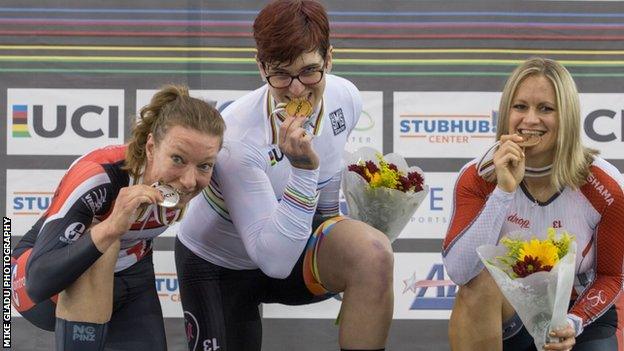Sharron Davies: Former British swimmer says transgender athletes should not compete in women's sport
- Published

Transgender cyclist Rachel McKinnon (centre) pictured with Jen Wagner-Assali (right), who called her victory "unfair"
Transgender athletes should not compete in female competitions in order to "protect women's sport", says former British swimmer Sharron Davies.
Her comments come after 18-time tennis Grand Slam singles champion Martina Navratilova said it was "cheating" to allow transgender women to compete in women's sport because they had unfair physical advantages.
One campaign group said Navratilova's comments were "transphobic".
Speaking to BBC Sport, Davies, 56, said she had spoken to many other female athletes who "feel the same way".
"It is not a transphobic thing - I really want to say we have no issue with people who are transgender," she said.
"Every single woman athlete I've spoken to, and I have spoken to many, all of my friends in international sports, understand and feel the same way as me.
"Unfortunately, a lot of people who are in the races [now] are in a very difficult predicament when they can't speak out. It maybe falls to the people who were competing [in the past] who would understand the predicament that is being faced at the moment to try to create a debate, and try to explain how we feel there needs to be a fair and level playing field."
Davies - a two-time Commonwealth Games gold medallist - says it is important sports' governing bodies debate the issue.
"We need to come up with something that works for everybody and everybody agrees with, rather than having all sorts of diverse rules," she added.
"We need to come up with a unified set of rules that is clear, concise and fair."
Davies' comments came a day after she posted her opinion on Twitter, external. The 1980 Olympic silver medallist said: "I believe there is a fundamental difference between the binary sex you are born with and the gender you may identify as.
"To protect women's sport, those with a male sex advantage should not be able to compete in women's sport."
In December, transgender cyclist Rachel McKinnon told BBC Sport she estimated she has received more than 100,000 hate messages on Twitter since she won her UCI Masters Track World Championship title in October.
Fellow cyclist Jen Wagner-Assali, who finished third, called it "unfair" and called on cycling's international governing body to change its rules.
On Saturday, McKinnon said Davies was a "transphobe" and was "sharing hate speech".
"There is no debate to be had over whether trans women athletes have an unfair advantage: it's clear that they don't," she said on Twitter, external.
Athlete Ally - a US-based organisation that campaigns for LGBT sportspeople - cut its links with Navratilova, external in the wake of the 62-year-old's comments, saying they "perpetuate dangerous myths".
Navratilova has been a long-standing campaigner for gay rights and suffered abuse when she came out as gay in the 1980s.
Under guidelines introduced in 2016, the International Olympic Committee (IOC) allows athletes transitioning from female to male to participate without restrictions.
Male to female competitors, however, are required to have kept their levels of testosterone - a hormone that increases muscle mass - below a certain level for at least 12 months.